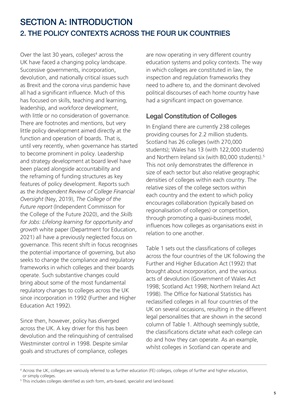
5
4 Across the UK, colleges are variously referred to as further education (FE) colleges, colleges of further and higher education,
or simply colleges.
5 This includes colleges identified as sixth form, arts-based, specialist and land-based.
Over the last 30 years, colleges4 across the
UK have faced a changing policy landscape.
Successive governments, incorporation,
devolution, and nationally critical issues such
as Brexit and the corona virus pandemic have
all had a significant influence. Much of this
has focused on skills, teaching and learning,
leadership, and workforce development,
with little or no consideration of governance.
There are footnotes and mentions, but very
little policy development aimed directly at the
function and operation of boards. That is,
until very recently, when governance has started
to become prominent in policy. Leadership
and strategy development at board level have
been placed alongside accountability and
the reframing of funding structures as key
features of policy development. Reports such
as the Independent Review of College Financial
Oversight (Ney, 2019), The College of the
Future report (Independent Commisson for
the College of the Future 2020), and the Skills
for Jobs: Lifelong learning for opportunity and
growth white paper (Department for Education,
2021) all have a previously neglected focus on
governance. This recent shift in focus recognises
the potential importance of governing, but also
seeks to change the compliance and regulatory
frameworks in which colleges and their boards
operate. Such substantive changes could
bring about some of the most fundamental
regulatory changes to colleges across the UK
since incorporation in 1992 (Further and Higher
Education Act 1992).
Since then, however, policy has diverged
across the UK. A key driver for this has been
devolution and the relinquishing of centralised
Westminster control in 1998. Despite similar
goals and structures of compliance, colleges
are now operating in very different country
education systems and policy contexts. The way
in which colleges are constituted in law, the
inspection and regulation frameworks they
need to adhere to, and the dominant devolved
political discourses of each home country have
had a significant impact on governance.
Legal Constitution of Colleges
In England there are currently 238 colleges
providing courses for 2.2 million students.
Scotland has 26 colleges (with 270,000
students); Wales has 13 (with 122,000 students)
and Northern Ireland six (with 80,000 students).5
This not only demonstrates the difference in
size of each sector but also relative geographic
densities of colleges within each country. The
relative sizes of the college sectors within
each country and the extent to which policy
encourages collaboration (typically based on
regionalisation of colleges) or competition,
through promoting a quasi-business model,
influences how colleges as organisations exist in
relation to one another.
Table 1 sets out the classifications of colleges
across the four countries of the UK following the
Further and Higher Education Act (1992) that
brought about incorporation, and the various
acts of devolution (Government of Wales Act
1998; Scotland Act 1998; Northern Ireland Act
1998). The Office for National Statistics has
reclassified colleges in all four countries of the
UK on several occasions, resulting in the different
legal personalities that are shown in the second
column of Table 1. Although seemingly subtle,
the classifications dictate what each college can
do and how they can operate. As an example,
whilst colleges in Scotland can operate and
SECTION A: INTRODUCTION
2. THE POLICY CONTEXTS ACROSS THE FOUR UK COUNTRIES